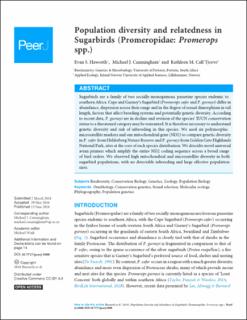Population diversity and relatedness in Sugarbirds (Promeropidae: Promerops spp.)
Peer reviewed, Journal article
Published version
Permanent lenke
https://hdl.handle.net/11250/2651515Utgivelsesdato
2018Metadata
Vis full innførselSamlinger
Sammendrag
Sugarbirds are a family of two socially-monogamous passerine species endemic to southern Africa. Cape and Gurney’s Sugarbird (Promerops cafer and P. gurneyi) differ in abundance, dispersion across their range and in the degree of sexual dimorphism in tail length, factors that affect breeding systems and potentially genetic diversity. According to recent data, P. gurneyi are in decline and revision of the species’ IUCN conservation status to a threatened category may be warranted. It is therefore necessary to understand genetic diversity and risk of inbreeding in this species. We used six polymorphic microsatellite markers and one mitochondrial gene (ND2) to compare genetic diversity in P. cafer from Helderberg Nature Reserve and P. gurneyi from Golden Gate Highlands National Park, sites at the core of each species distribution. We describe novel universal avian primers which amplify the entire ND2 coding sequence across a broad range of bird orders. We observed high mitochondrial and microsatellite diversity in both sugarbird populations, with no detectable inbreeding and large effective population sizes.
Beskrivelse
Copyright 2018 Haworth et al. Distributed under Creative Commons CC-BY 4.0

